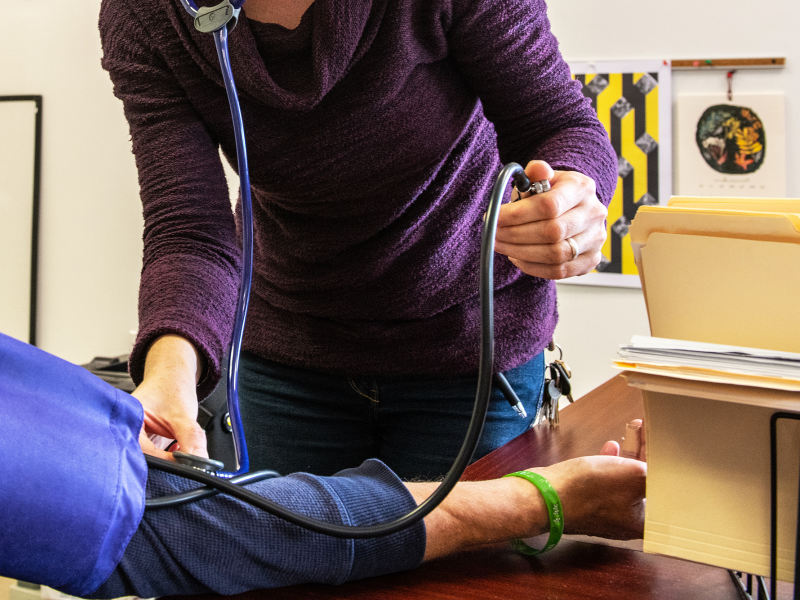At Pathways to Housing PA, The People Make the Difference
Jeff Jackson is not new to social services. With 15 years of experience in social services and substance use treatment, he’s seen a lot. Yet 4 months into his role as the Assistant Team Leader on Team 7 at Pathways, he’s experiencing many things for the first time.
“I’m sorry I’m late,” he says, sitting down. One of his participants has been expressing some concerns about their housing, Jeff explains, and he’s just come from a meeting with the housing director. “We just pulled together a team to make sure we were doing the best job possible supporting him. That kind of stuff still amazes me.”
When Jeff first heard about the job with Pathways, he was a little skeptical. “I’ve been criticized by coworkers in the past for not wanting to throw people out just because they were using drugs. But when I heard that Pathways practiced Harm Reduction while housing people, I thought to myself, ‘How do they do that?’”
Jeff heard about a job opportunity with Pathways, and decided to sate his curiosity and come in for an interview. “As soon as I left, I knew I really wanted the job.” Several months in, his passion still hasn’t diminished. “Even my wife points out how much I love it. The culture here is unbelievable; the team concept is phenomenal.”
Stephanie Callahan, 2 months into her role as the Manager of Compliance and Continuous Quality Improvement, cites similar reasons for loving her job. “The staff here is very passionate, and very attentive to the participants.”
Like Jeff, Stephanie has had a long career in mental health, working at the Mental Health Association (MHA) and in D&A prevention for youth.
MHA is an important player in the Pathways to Housing PA backstory. While Stephanie worked there, she met Chris Simiriglia, Sandra Romeo and Donna Chiavaroli, all women who are important to who Pathways is today. “When Chris launched Pathways in 2008, she invited me to do some consulting work to set up compliance monitoring and help with HR and special projects,” Stephanie says.
Consulting gave Stephanie the freedom to spend more time raising her two kids. About a year ago, she realized she was ready to come back to full-time employment, and soon thereafter applied for the role at Pathways. “It was an easy choice,” she says.
As Director of Human Resources Albert Curcio will tell you, Stephanie and Jeff’s observations about Pathways’ culture are not unique. When asked what employees say they love most about working for Pathways, he says “The people, the people, the people! Grace and kindness are simple words but sometimes the actual practice is not so simple. Yet these are the words that define how we do our work, and these are words that define our employees.”
Jeff recently got to share this person-focused approach with a newer participant. This man struggles with substance use disorder, and because of the relational vulnerability his substance use created, he allowed some ill-intentioned people to move into his apartment.
“Our team decided to relocate him to a new apartment to help him get a fresh start,” Jeff explains. They talked through the plan with him, and made an appointment to help him move. “When we showed up to move him, he just had this look on his face like ‘I messed up. They’re going to throw me out.’ He truly didn’t believe we were moving him.”
Jeff started packing his things into the van, and the participant turned to him, stunned. “I’m still staying in the program?” he asked. “Yes” Jeff said. “We’re not kicking you out. That’s not who we are.”
Even though Stephanie’s role at Pathways isn’t focused on interacting directly with participants every day, she has also been struck by the level of care. “Everyone is treated with respect. People take time and actually talk to participants, and listen to what they have to say.”
That culture is something Pathways has built over time, but it starts with hiring staff that are deeply committed to serving our population. “We hire people who are committed to Pathways’ mission to empower people with disabilities to improve their housing stability, increase wellness, and reclaim their lives,” Albert says.
For Jeff, a big part of that culture comes with the team model. While many service agencies assign individual case managers to serve a group of participants, Pathways connects participants with a whole team dedicated to their well-being.
Recently, the nursing staff at Pathways needed an update on some of Team 7’s participants, and Jeff’s Team Leader wasn’t available. “It was no problem,” Jeff says. “Because of the team model, I knew what was going on with all of the participants, and was able to get the nurses the information they needed.”
From direct service staff to accountants, HR professionals to development staff, Pathways hires people who are ready to make a difference in the lives of individuals struggling with homelessness, substance use and mental illness. If you're ready to join our team, or you know someone else who would be a good fit, take a look at our current job opportunities here.
Like us on Facebook and follow us on Twitter
About the Author
Becca DeWhitt is an MBA candidate at Temple University. She is passionate about creating a world where everyone's experience and perspective is valued, and sees story-telling as a powerful tool to that end.


